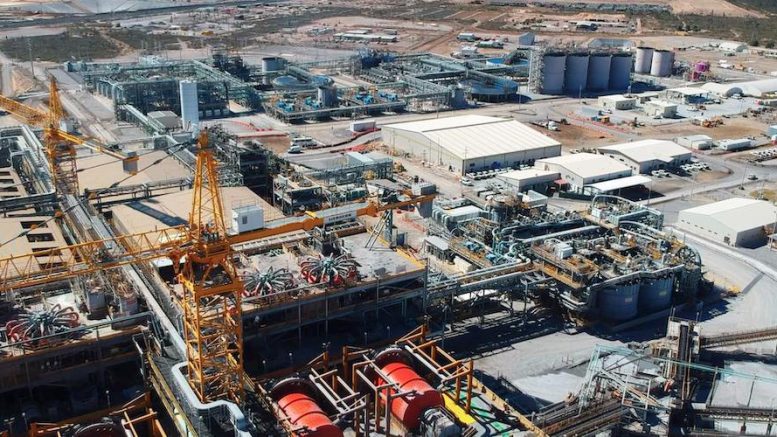Mexico’s mining industry faces a potential crisis after a new law this year radically changes how projects can be registered, approved and developed.
Veteran Latin America investor Ross Beaty calls it extremely damaging for investment. Mexico’s top mining organization says it will cost the country billions. Even Canadian politicians are concerned.
President Andres Manuel López Obrador adopted a populist stance since coming to power in 2018, including the nationalization of the lithium industry last year even though it doesn’t have any producing mines yet. It was clear signal that the state wasn’t going to be left out of what could turn out to be one of the most lucrative battery metals.
The worldwide number of electric vehicles is expected to accelerate 10 times current levels to 250 million in just the few years to 2030, according to the International Energy Agency. Mexico’s lithium move coincided with efforts by Latin American powers in the light metal such as Argentina, Chile and Bolivia to increase government control and consider forming a cartel for the commodity like OPEC.
Can similar measures lie ahead for Mexico’s silver output, the world’s largest by far – almost double second-place China – as the metal critical for solar panels become key in the green energy transition?
But that isn’t even the biggest concern right now.
The ruling Morena party passed wider mining legislation in late April that shortened concessions to 30 from 50 years, tightened rules for water permits, boosted local community benefits and imposed a public tender system for all concessions instead of claims staking. The law heightened pre-consultation requirements, toughened impact studies and levied financial commitments, or bonding, that could prove onerous for junior explorers. Some of the language is vague, and opportunities for challenges are clouded by lack of capacity and allegations of corruption.
“The law is a very significant negative to Mexico’s previously good investment climate for mining,” Beaty said at the time. – “It’s extremely damaging, hostile to the industry and harms competitiveness on the global stage.”
Mexico’s mining production was valued at US$16.7 billion in 2021, according to the U.S. Department of Commerce. The country’s national mining chamber, Camimex, says the new law will cost the country US$9 billion in investment and 420,000 jobs.
The new regulations, such as securing bonding for projects, threaten the ability of Canadian juniors to invest in Mexico, says Joe Mazumdar, an analyst with Vancouver-based mining newsletter Exploration Insights. Even more concerning is the provision allowing authorities to cancel exploration concessions if no work is completed within just two years.
Canada’s Trade Minister, Mary Ng, criticized the mining reforms in a call with Mexican Economy Minister Raquel Buenrostro in April. Ng said the law could reduce Canadian investment in Mexico’s mining sector and limit North American supply chain resiliency.
Still, the return of manufacturing operations from countries like the United States and Canada to Mexico is a promising sign of the country’s economic revival. Mexico’s Jan.-Oct 2022 exports of goods to the U.S. rose more than 20% to US$382 billion compared with the same period in 2021, according to U.S. census data.
The S&P Global Mexico Manufacturing Purchasing Managers’ Index, a measure of the country’s factories, rose to 53.2 in July from 50.9 in June, marking the sixth period of expansion and the highest reading since May 2016. This resurgence, fueled by favourable labour costs and trade dynamics, signifies a potential turning point. Mazumdar argues the economic health allows López Obrador to take on challenges in the mining industry.
But on the other hand, gross domestic product per capita in Mexico, at US$10,050 in 2021 according to the World Bank, is a quarter less than China at US$12,250 and just a fraction of Canada at US$52,000 or the U.S. at US$70,250. It’s poor.
And López Obrador must also consider Mexico’s centuries of mineral exploitation by foreigners. Industry disasters like the 2014 spill of 40 million litres of sulphuric acid above the Sonora River, and coal mine collapses in the state of Coahuila that have killed scores have fed anti-mining sentiment even as the president attempted to give miners more work by easing safety rules.
López Obrador, who turns 70 in November, has repeatedly said he will not try to change the constitution to run next year for another six-year term. Presidents are limited to one term, so the chance remains for change at the top before this new law becomes ingrained in the bureaucracy. And, as Colin McClelland reports, mining investment in projects has actually been increasing this year despite the new law.
Analysts agree legal challenges to the constitutionality of these abrupt reforms are expected. Law firms are recommending miners consider trade pacts like the Comprehensive & Progressive Trans-Pacific Partnership for investor-state arbitration.
But the future remains uncertain. The prospect of a protracted legal battle adds to the growing sense of malaise surrounding investments in Mexico’s mining industry.
The impact extends beyond mere financial considerations. The shift to public auctions for granting mineral concessions, a departure from the previous applicant-priority process, adds complexity and unpredictability to an already challenging landscape.
López Obrador already has some crippling labour disruptions to sort out. A strike has closed Newmont’s Peñasquito mine since early June, affecting 28,000 indirect jobs and an operation that contributed US$1.9 billion to Mexico’s economy last year.
In a world where investment capital is increasingly mobile, the Mexican government’s sweeping changes to its mining regulations cools interest from domestic and international investors. The economic impact could be severe. The global mining community is watching closely, assessing the broader implications for the industry and questioning the direction of a nation once poised for mining prosperity.





Be the first to comment on "Mexico’s disruptive shift on mining creates far-reaching concerns "